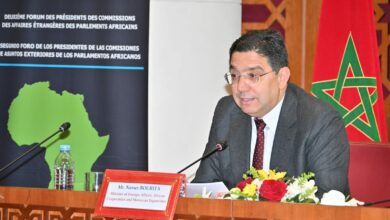A View from Two Shores: A Transcontinental Dialogue on Global Trade and Shifting Power Dynamics
A View from Two Shores: A Transcontinental Dialogue on Global Trade and Shifting Power Dynamics

ALDAR/
At a time when geopolitical tensions are escalating and trade wars intensifying, a unique dialogue brings together two voices from different worlds: Chinese journalist Ma Jiaying and African media figure Heribert Adjouvi, in an in-depth discussion on the transformations reshaping the world amid the new wave of globalization and the trade war led by the United States.
Stepping beyond geographic biases, the conversation calls for a re-evaluation of international relations—especially as global attention turns to the 70th anniversary of the Bandung Conference, a milestone in the Global South’s struggle for a more just and balanced world. Both journalists argue that the current crisis surrounding tariffs is not merely an economic dispute but a sign of a transitional era, signaling the end of unipolar dominance and the emergence of a fairer multipolar order.
From her position as a presenter of an international affairs program, Ma Jiaying emphasizes that the American economic offensive cannot be separated from its long history of colonial exploitation. She notes that globalization was never a level playing field but rather a tool imposed by major powers to serve their own interests. According to her, the recent U.S. measures—despite their harm—will ultimately strengthen China’s spirit of self-reliance and push it to deepen internal openness.
For his part, Adjouvi believes the trade war between China and the U.S. is merely a front for a deeper struggle for influence over the Global South, particularly Africa, which has become a major arena for international competition. He adds that the U.S., through its protectionist policies, is closing the door on promising partnerships with Africa, while China is extending its hand through real development projects, most notably the Belt and Road Initiative.
Adjouvi warns of the impact of these tariffs on fragile African economies, especially those reliant on exporting raw materials or light industries to the U.S. market. From Mauritius to Nigeria, the consequences are being felt in the form of higher taxes and job losses, prompting a growing number of countries to diversify their trade partnerships and enhance cooperation with China.
Ma Jiaying and Adjouvi agree that China-Africa relations are no longer just a strategic option but a historical necessity. With China granting full tariff exemptions on imports from over thirty African countries, it demonstrates a clear commitment to supporting these nations’ growth free from Western constraints. In this sense, Beijing represents not just an economic alternative but a model of partnership based on mutual respect and shared benefit.
In this context, the conversation revives the spirit of Bandung—the same spirit that, seventy years ago, united Asian and African peoples in a shared dream of a more humane world. Today, amid mounting global challenges, the two journalists believe that spirit still has the power to inspire new solutions, guiding humanity toward a more balanced international order—one led not just by traditional powers, but by the Global South as essential architects of a more inclusive future.





